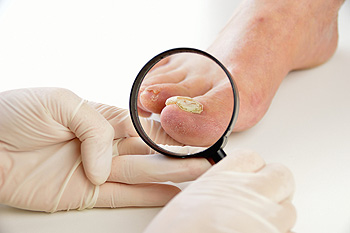Preventing Heel Pain
 The heel is the largest bone in the foot, and pain occurring in either the front, back, or bottom of it can sometimes be debilitating. Foot abnormalities, wearing ill-fitting shoes, and injury are all possible causes of heel pain. Four of the most common conditions that cause heel pain are heel spurs, plantar fasciitis, excessive pronation, and Achilles tendinitis. There are ways to help prevent these conditions that can be implemented in everyday life. Wearing the right shoes for every activity is important, especially when exercising. Stretching before exercising will help prepare your feet for the strain that is caused by certain amounts of physical activity. Pacing yourself is also essential; your feet can become overworked and when put under too much stress will react poorly. If you are experiencing heel pain, make an appointment with a podiatrist who can offer proper treatment options.
The heel is the largest bone in the foot, and pain occurring in either the front, back, or bottom of it can sometimes be debilitating. Foot abnormalities, wearing ill-fitting shoes, and injury are all possible causes of heel pain. Four of the most common conditions that cause heel pain are heel spurs, plantar fasciitis, excessive pronation, and Achilles tendinitis. There are ways to help prevent these conditions that can be implemented in everyday life. Wearing the right shoes for every activity is important, especially when exercising. Stretching before exercising will help prepare your feet for the strain that is caused by certain amounts of physical activity. Pacing yourself is also essential; your feet can become overworked and when put under too much stress will react poorly. If you are experiencing heel pain, make an appointment with a podiatrist who can offer proper treatment options.
Many people suffer from bouts of heel pain. For more information, contact Dr. Steven Shlonsky of Louisville, Kentucky. Dr. Shlonsky can provide the care you need to keep you pain-free and on your feet.
Causes of Heel Pain
Heel pain is often associated with plantar fasciitis. The plantar fascia is a band of tissues that extends along the bottom of the foot. A rip or tear in this ligament can cause inflammation of the tissue.
Achilles tendonitis is another cause of heel pain. Inflammation of the Achilles tendon will cause pain from fractures and muscle tearing. Lack of flexibility is also another symptom.
Heel spurs are another cause of pain. When the tissues of the plantar fascia undergo a great deal of stress, it can lead to ligament separation from the heel bone, causing heel spurs.
Why Might Heel Pain Occur?
- Wearing ill-fitting shoes
- Wearing non-supportive shoes
- Weight change
- Excessive running
Treatments
Heel pain should be treated as soon as possible for immediate results. Keeping your feet in a stress-free environment will help. If you suffer from Achilles tendonitis or plantar fasciitis, applying ice will reduce the swelling. Stretching before an exercise like running will help the muscles. Using all these tips will help make heel pain a condition of the past.
If you have any questions please contact our office located in Louisville, KY . We offer the newest diagnostic and treatment technologies for all your foot and ankle needs.
Symptoms of Toenail Fungus
 One of the first symptoms of a condition that is known as toenail fungus is nail discoloration. Additionally, the nails may become thickened and brittle, and it is common for it to spread to other nails. This particular fungus lives and thrives in warm and moist environments which may include public pools, shower room floors, or locker rooms. Some patients may develop this fungus by having wet nails for the majority of the time, and this may come from wearing sweaty shoes and socks. People who are diabetic or have a weakened immune system may benefit from seeking immediate treatment. These patients may experience sores that do not heal properly, and an early diagnosis may determine if it is a nail infection. If you feel you may have this condition, it is suggested to speak to a podiatrist who can properly diagnosis and treat this ailment.
One of the first symptoms of a condition that is known as toenail fungus is nail discoloration. Additionally, the nails may become thickened and brittle, and it is common for it to spread to other nails. This particular fungus lives and thrives in warm and moist environments which may include public pools, shower room floors, or locker rooms. Some patients may develop this fungus by having wet nails for the majority of the time, and this may come from wearing sweaty shoes and socks. People who are diabetic or have a weakened immune system may benefit from seeking immediate treatment. These patients may experience sores that do not heal properly, and an early diagnosis may determine if it is a nail infection. If you feel you may have this condition, it is suggested to speak to a podiatrist who can properly diagnosis and treat this ailment.
If left untreated, toenail fungus may spread to other toenails, skin, or even fingernails. If you suspect you have toenail fungus it is important to seek treatment right away. For more information about treatment, contact Dr. Steven Shlonsky of Louisville, Kentucky. Dr. Shlonsky can provide the care you need to keep you pain-free and on your feet.
Symptoms
- Warped or oddly shaped nails
- Yellowish nails
- Loose/separated nail
- Buildup of bits and pieces of nail fragments under the nail
- Brittle, broken, thickened nail
Treatment
If self-care strategies and over-the-counter medications does not help your fungus, your podiatrist may give you a prescription drug instead. Even if you find relief from your toenail fungus symptoms, you may experience a repeat infection in the future.
Prevention
In order to prevent getting toenail fungus in the future, you should always make sure to wash your feet with soap and water. After washing, it is important to dry your feet thoroughly especially in between the toes. When trimming your toenails, be sure to trim straight across instead of in a rounded shape. It is crucial not to cover up discolored nails with nail polish because that will prevent your nail from being able to “breathe”.
In some cases, surgical procedure may be needed to remove the toenail fungus. Consult with your podiatrist about the best treatment options for your case of toenail fungus.
If you have any questions, please feel free to contact our office located in Louisville, KY . We offer the newest diagnostic and treatment technologies for all your foot care needs.
Can Ingrown Toenails Be Prevented?
 Patients who have ingrown toenails are often aware of the pain they may cause. It occurs when the side of the nail grows into the skin surrounding the big toe, and may often look red and swollen. Additionally, some people may notice a discharge coming from the affected area, and may have chills or feel warm. There are measures that can be implemented, which may prevent ingrown toenails from developing. These may include trimming the toenails to the correct length and width, and wearing shoes that fit correctly with adequate room for the toes to move freely in. Mild relief may be found if the toe is soaked in warm water several times per day, in addition to wearing open-toe sandals. If you are a diabetic patient, or if your ingrown toenail causes extreme pain, it is suggested to seek the counsel of a podiatrist who can properly treat this condition.
Patients who have ingrown toenails are often aware of the pain they may cause. It occurs when the side of the nail grows into the skin surrounding the big toe, and may often look red and swollen. Additionally, some people may notice a discharge coming from the affected area, and may have chills or feel warm. There are measures that can be implemented, which may prevent ingrown toenails from developing. These may include trimming the toenails to the correct length and width, and wearing shoes that fit correctly with adequate room for the toes to move freely in. Mild relief may be found if the toe is soaked in warm water several times per day, in addition to wearing open-toe sandals. If you are a diabetic patient, or if your ingrown toenail causes extreme pain, it is suggested to seek the counsel of a podiatrist who can properly treat this condition.
Ingrown toenails can become painful if they are not treated properly. For more information about ingrown toenails, contact Dr. Steven Shlonsky of Louisville, Kentucky. Dr. Shlonsky can provide the care you need to keep you pain-free and on your feet.
Ingrown Toenails
Ingrown toenails occur when a toenail grows sideways into the bed of the nail, causing pain, swelling, and possibly infection.
Causes
- Bacterial infections
- Improper nail cutting such as cutting it too short or not straight across
- Trauma to the toe, such as stubbing, which causes the nail to grow back irregularly
- Ill-fitting shoes that bunch the toes too close together
- Genetic predisposition
Prevention
Because ingrown toenails are not something found outside of shoe-wearing cultures, going barefoot as often as possible will decrease the likeliness of developing ingrown toenails. Wearing proper fitting shoes and using proper cutting techniques will also help decrease your risk of developing ingrown toenails.
Treatment
Ingrown toenails are a very treatable foot condition. In minor cases, soaking the affected area in salt or antibacterial soaps will not only help with the ingrown nail itself, but also help prevent any infections from occurring. In more severe cases, surgery is an option. In either case, speaking to your podiatrist about this condition will help you get a better understanding of specific treatment options that are right for you.
If you have any questions please feel free to contact our office located in Louisville, KY . We offer the newest diagnostic and treatment technologies for all your foot and ankle needs.
Bunion Foot Surgery
 Foot surgery can sound intimidating, but it is actually common among those with foot complications. There a few common issues that when severe enough, can lead to foot surgery. Bunions are one of these issues. Usually, bunions can be treated in ways that do not require surgery, but there are some instances where surgery is the best option to alleviate the uncomfortable or painful symptoms associated with bunions. Bunions result in a protrusion under the big toe, this protrusion is caused by the joint under the big toe bending and becoming deformed. High heels are a common cause for bunions, because they contort these bones. The surgery for bunions is not too complicated, the surgeon performs an osteotomy, which is the straightening of the big toe and metatarsals. After the surgery is done, the recovery period is usually six weeks. If you are concerned about your bunion, then it is highly recommended that you speak with a podiatrist to learn about the right treatment options for you.
Foot surgery can sound intimidating, but it is actually common among those with foot complications. There a few common issues that when severe enough, can lead to foot surgery. Bunions are one of these issues. Usually, bunions can be treated in ways that do not require surgery, but there are some instances where surgery is the best option to alleviate the uncomfortable or painful symptoms associated with bunions. Bunions result in a protrusion under the big toe, this protrusion is caused by the joint under the big toe bending and becoming deformed. High heels are a common cause for bunions, because they contort these bones. The surgery for bunions is not too complicated, the surgeon performs an osteotomy, which is the straightening of the big toe and metatarsals. After the surgery is done, the recovery period is usually six weeks. If you are concerned about your bunion, then it is highly recommended that you speak with a podiatrist to learn about the right treatment options for you.
Foot surgery is sometimes necessary to treat a foot ailment. To learn more, contact Dr. Steven Shlonsky of Louisville, Kentucky. Dr. Shlonsky will assist you with all of your foot and ankle needs.
When Is Surgery Necessary?
Foot and ankle surgery is generally reserved for cases in which less invasive, conservative procedures have failed to alleviate the problem. Some of the cases in which surgery may be necessary include:
- Removing foot deformities like bunions and bone spurs
- Severe arthritis that has caused bone issues
- Cosmetic reconstruction
What Types of Surgery Are There?
The type of surgery you receive will depend on the nature of the problem you have. Some of the possible surgeries include:
- Bunionectomy for painful bunions
- Surgical fusion for realignment of bones
- Neuropathy decompression surgery to treat nerve damage
Benefits of Surgery
Although surgery is usually a last resort, it can provide more complete pain relief compared to non-surgical methods and may allow you to finally resume full activity.
Surgical techniques have also become increasingly sophisticated. Techniques like endoscopic surgery allow for smaller incisions and faster recovery times.
If you have any questions please feel free to contact our office located in Louisville, KY . We offer the newest diagnostic and treatment technologies for all your foot and ankle needs.







